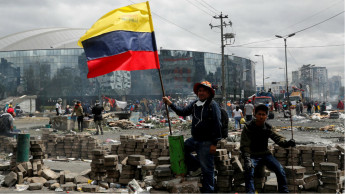indigenous
Australian Parliament takes step toward holding a referendum on Indigenous Voice this year
Australia's House of Representatives voted overwhelming Wednesday for a referendum to be held this year on creating an Indigenous Voice to Parliament, an advocate aiming to give the nation's most disadvantaged ethnic minority more say on government policy.
While the Voice would advocate for Indigenous interests, it would not have a vote on laws, and debate for and against the elected body has become increasingly heated and divisive.
The 121-to-25 House vote that approved the referendum being held does not reflect the level of lawmakers' support for enshrining the Voice in the constitution. The opposition conservative Liberal Party voted in support of giving Australians a choice at a referendum but is also campaigning for the Voice to be rejected by the public.
Also read: Australian lawmaker breaks ranks to support Indigenous Voice
The Senate will vote on the bill in June, and the bill needs majority support to ensure that Australia's first referendum since 1999 takes place between October and December this year. A majority of senators have already flagged their support.
Minister for Indigenous Australians Linda Burney, the first Indigenous woman to hold the role, said the campaigning would begin in earnest with a successful Senate vote. She had "no doubt" the referendum would succeed.
"A yes vote at a referendum ... will move Australia forward for everyone. It will be a new chapter in our country's story," Burney told reporters.
Also Read: Australian opposition against Indigenous Voice in Parliament
"And a yes vote will make a practical difference — I cannot stress that enough — the Voice will make a practical difference. Because the solutions to so many of our challenges can be found in the knowledge and the wisdom of local (Indigenous) communities," Burney added.
Proponents hope the Voice will improve living standards for Indigenous Australians, who account for 3.2% of Australia's population and are the most nation's most disadvantaged ethnic group.
Australia's Race Discrimination Commissioner Chin Tan, a racism law watchdog, has warned that focusing the public debate on race emboldens racists and exposes the Indigenous population to abuse and vilification.
The Liberal Party and the Nationals party, which formed a conservative coalition government for nine years until elections a years ago, argue the Voice would create a racial divide.
Opposition leader Peter Dutton has told Parliament the proposal would permanently divide Australians by race. "It will have an Orwellian effect where all Australians are equal, but some Australians are more equal than others," Dutton said.
Prime Minister Anthony Albanese, who committed his center-left Labor Party government on election night last year to holding the referendum, said "scare campaigns" against the Voice would not find traction among most Australians.
"Australians won't succumb to their appeals to fear and their ever-more ludicrous invitations to jump at our own shadows," Albanese said in a recent speech.
Speaking in support of the Voice, government minister Tim Watts urged his fellow lawmakers to address Australia's history of refusing to recognize or listen to its Indigenous people.
Watts quoted his own ancestor as a cautionary example: John Watts, a 19th century colonial lawmaker who had justified state-condoned extrajudicial police shootings of Indigenous Outback tribes.
"The natives must be taught to feel the mastery of the whites," John Watts had told the Queensland state Parliament in 1861.
"The natives, knowing no law, nor entertaining any fears but those of the carbine (rifle): there were no other means of ruling them," John Watts had added.
His descendant, Tim Watts, urged lawmakers in Parliament to: "Take this moment to be good ancestors."
Opinion polls show the Voice has majority public support. But many observers say support is not yet high enough to indicate a successful referendum.
Of the 44 referendums held since the constitution took effect in 1901, only eight have been carried and none since 1977.
No referendum has ever been passed without the bipartisan support the major political parties.
The Voice was recommended in 2017 by a group of 250 Indigenous leaders who met at Uluru, a landmark sandstone rock in central Australia that is a scared site to traditional owners. They were delegates of the First Nations National Constitutional Convention that the then-government had asked for advice on how the Indigenous population could be acknowledged in the constitution.
The conservative government immediately rejected the prospect of the Voice, which it likened to a third chamber of Parliament.
2 years ago
As tiger count grows, India’s Indigenous demand land rights
Just hours away from several of India's major tiger reserves in the southern city of Mysuru, Prime Minister Narendra Modi is set to announce Sunday how much the country's tiger population has recovered since its flagship conservation program began 50 years ago.
Protesters, meanwhile, will tell their own stories of how they have been displaced by such wildlife conservation projects over the last half-century.
Project Tiger began in 1973 after a census of the big cats found India’s tigers were fast going extinct through habitat loss, unregulated sport hunting, increased poaching and retaliatory killing by people. Laws attempted to address those issues, but the conservation model centered around creating protected reserves where ecosystems can function undisturbed by people.
Several Indigenous groups say the conservation strategies, deeply influenced by American environmentalism, meant uprooting numerous communities that had lived in the forests for millennia.
Members of several Indigenous or Adivasi groups — as Indigenous people are known in the country — set up the Nagarahole Adivasi Forest Rights Establishment Committee to protest evictions from their ancestral lands and seek a voice in how the forests are managed.
“Nagarahole was one of the first forests to be brought under Project Tiger and our parents and grandparents were probably among the first to be forced out of the forests in the name of conservation,” said J. A. Shivu, 27, who belongs to the Jenu Kuruba tribe. “We have lost all rights to visit our lands, temples or even collect honey from the forests. How can we continue living like this?”
The fewer than 40,000 Jenu Kuruba people are one of the 75 tribal groups that the Indian government classifies as particularly vulnerable. Jenu, which means honey in the southern Indian Kannada language, is the tribe’s primary source of livelihood as they collect it from beehives in the forests to sell. Adivasi communities like the Jenu Kurubas are among the poorest in India.
Experts say conservation policies that attempted to protect a pristine wilderness were influenced by prejudices against local communities.
The Indian government's tribal affairs ministry has repeatedly said it is working on Adivasi rights. Only about 1% of the more than 100 million Adivasis in India have been granted any rights over forest lands despite a government forest rights law, passed in 2006, that aimed to “undo the historical injustice" for forest communities.
Their Indigenous lands are also being squeezed by climate change, with more frequent forest fires spurred by extreme heat and unpredictable rainfall.
India's tiger numbers, meanwhile, are ticking upwards: the country's 2,967 tigers account for more than 75% of the world’s wild tiger population. India has more tigers than its protected spaces can hold, with the cats also now living at the edge of cities and in sugarcane fields.
Tigers have disappeared in Bali and Java and China’s tigers are likely extinct in the wild. The Sunda Island tiger, the other sub-species, is only found in Sumatra. India's project to safeguard them has been praised as a success by many.
“Project Tiger hardly has a parallel in the world since a scheme of this scale and magnitude has not been so successful elsewhere,” said SP Yadav, a senior Indian government official in charge of Project Tiger.
But critics say the social costs of fortress conservation — where forest departments protect wildlife and prevent local communities from entering forest regions — is high. Sharachchandra Lele, of the Bengaluru-based Ashoka Trust for Research in Ecology and the Environment, said the conservation model is outdated.
"There are already successful examples of forests managed by local communities in collaboration with government officials and tiger numbers have actually increased even while people have benefited in these regions,” he said.
Vidya Athreya, the director of Wildlife Conservation Society in India who has been studying the interactions between large cats and humans for the last two decades, agreed.
“Traditionally we always put wildlife over people,” Athreya said, adding that engaging with communities is the way forward for protecting wildlife in India.
Shivu, from the Jenu Kuruba tribe, wants to go back to a life where Indigenous communities and tigers lived together.
“We consider them gods and us the custodians of these forests,” he said.
2 years ago
From a secret safehouse, Peru's Indigenous revolt advances
In an industrial corridor of Peru's capital, a dingy stairwell leads to a second-floor safehouse. Dozens of Quechua and Aymara activists lie on mattresses strewn on the floor, resting up for more anti-government demonstrations as volunteers cook a breakfast of donated rice, pasta and vegetables.
Among the makeshift refuge's occupants is Marcelo Fonseca. The 46-year-old watched as a a friend was shot and killed in December as they battled security forces in the southern city of Juliaca. Within hours, Fonseca joined a caravan of demonstrators that descended on the capital, Lima, to demand the resignation of interim President Dina Boluarte.
“Our Andean blood burns when we become furious,” Fonseca, whose native language is Quechua, said in a halting Spanish. ”It runs faster. That’s what brings us here.”
Two months into Peru’s angry insurrection, emotions have hardened. While the unrest has barely disturbed the late-night revelry in Lima's beachside enclaves, roadblocks still rage across the countryside, scaring away foreign tourists and leading to shortages of gas and other staples.
The tumult, which has left at least 60 dead, was triggered by the impeachment in December of President Pedro Castillo. To Peruvians like Fonseca, the leftist rural teacher was a symbol of their own exclusion, while Boluarte's ascension to power from the vice presidency in cahoots with Castillo's conservative enemies in Congress is seen as an unforgivable class betrayal.
The impasse has given a jolt of self-confidence to Peru's Indigenous movement. Unlike neighboring Bolivia, where Indigenous groups were emboldened by Aymara coca-grower Evo Morales' election as president in 2006, or Ecuador, where ethnic groups have a long tradition of toppling unpopular governments, Peru's Indigenous groups had long struggled to gain political influence.
Although Peruvians of all backgrounds take pride in the history of the Inca Empire, the country's Indigenous population is often treated with neglect and even hostility. Little is done to promote Quechua, despite its being spoken by millions and being an official language since 1975. Not until the 2017 census were Peruvians even asked whether they identify with any one of 50-plus Indigenous groups.
Tarcila Rivera, a prominent Quechua activist and former adviser to the United Nations on Indigenous issues, attributes the disdain to systemic racism stretching back to the Spanish conquest.
“Despite the two hundred years since the founding of our republic, the reality is that those of us who come from pre-Hispanic civilizations haven't obtained our rights, nor are those rights taken into account,” said Rivera.
The current turmoil has also unleashed a torrent of racism. One lawmaker from the floor of Congress disparaged the rainbow-colored Wiphala flag, which represents the native people of the Andes, as little more than a “chifa tablecloth,” using the word for a cheap Chinese restaurant. Another urged security forces to send protesters to Bolivia with a big “kick.”
Rivera says the crackdown has radicalized younger protesters. Meanwhile, the spread of smartphones and the Internet during the past few decades of economic stability has made Indigenous Peruvians more aware of their rights, the country's gaping inequalities and the sacrifices of previously unheralded Indigenous heroes, whose achievements contrast with narratives of perennial victimhood.
“All our kids are ever been taught is that we're losers, miserable souls who were conquered without a fight," Rivera said.
The current protest movement is centered in the southern Andes, where Indigenous identity is strongest. The area is the source of much of Peru's mineral wealth and is home to archeological jewels that attracted more than 4 million tourists a year before COVID.
Its peasants are also among Peru's most neglected.
Those inequalities were on vivid display this month at a roadblock near Cusco, where a group of campesinos sat vigil for hours over a roadblock of tires, tree trunks and boulders. As the line of stranded vehicles grew, tensions flared as motorists complaining that they had family emergencies.
“Don't yell at me when I'm speaking to you with manners!” barked one motorist who faulted the protestors for voting for Castillo, who lived in an adobe home in one of Peru's poorest districts before winning the presidency. “Don't let shameless politicians, who are often from the same community, trick you," he said repeating a false narrative held by elites that Castillo's victory was the result of bribes, fraud and chicanery.
Eventually, the demonstrators yielded to the pressure and briefly opened the road, after a harangue against the “millionaires" and powerful interests blamed for driving their community to desperate actions.
Back in Lima, the safehouse is a hive of activity as another day of demonstrating awaits. Hand-written signs list daily chores to keep the cramped quarters safe and clean. Dozens more activists from Cusco are expected soon and need to be lodged in one of the few dozen homes, apartments and businesses across the capital that have opened their doors, like clandestine rebel bases.
Discretion is a must. Like Fonseca, many of the demonstrators were already detained when security forces firing tear gas last month stormed a university campus at breakfast and arrested hundreds for trespassing. As a result, occupants are encouraged to leave the safehouse one or two at a time, turn off lights early and immediately report any police intrusion to two human-rights attorneys on permanent standby. The windows are covered with newspapers and dog-food bags to block out would-be snoops.
But more than fear, the mood is one of hope.
“No matter what happens, I dare say we've already won,” said Victor Quinones as he stuffs a wad of coca leaves into his cheek.
At 60, Quinones is one of the group's veterans. He says the past few weeks in the capital have strengthened his resolve to push forward and no longer accept the status quo — or futile standoffs with police back home as the best way to change it.
“We broke the barrier. We've started our long march — and look at all this support we've garnered along the way," he reflects. "We've won because, now, the world knows.”
3 years ago
Indigenous man shot dead in Bandarban
A 38-year-old indigenous man was allegedly shot dead by some miscreants at Taracha union in Rowangchhari upazila of Bandarban on Tuesday.
The deceased was identified as Mangsai Marma, a local ayurvedic practitioner of the upazila.
The miscreants shot Mangsai Marma in the area between Baraitali and Kadampru Para roads of the upazila, after finding him alone around 4:30 pm, according to Md Abdul Mannan, officer-in-charge (OC) of Rowangchhari police station.
Read: Student killed in city road crash
Hearing gunshots, locals rushed to the spot and found him dead, said Taracha Union Parishad Chairman Anu Mong Marma.
An investigation is on to find out the reason and full circumstances surrounding the killing, said the OC.
3 years ago
Directive to restrict use of ‘Indigenous’ unconstitutional
Fifty eminent citizens of the country in a joint statement have said that the Information Ministry’s restriction to use the word ‘Indigenous’ is unconstitutional and tantamount to contempt of the court.
“The Information Ministry has sent a circular to all the television channel owners saying that they’ll have to broadcast the restriction on using the word ‘Indigenous’ to prevent those who’ll take part in programs commemorating the International Day of The World’s Indigenous Peoples on August 9 from using the word. We find the restriction self-contradictory as the government which has imposed the restriction had used the word ‘Indigenous’ more than once in its election manifesto in 2008,” read the statement.
The statement added that in the country’s constitution, it has been stated that if any question arises over any subject mentioned in the constitution, it’s the Supreme Court which has the only jurisdiction to provide explanation on that issue, not any other institution. The Supreme Court itself had said in one of its verdicts that there is no constitutional bindings on using the word ‘Indigenous’, which goes against the restriction put out by the Information Ministry.
“The ILO convention 107 was signed by Father of The Nation Bangabandhu Sheikh Mujibur Rahman-led government in 1972, where the word ‘Indigenous’ was not only used but the rights of all the indigenous people of the country were also recognized. In 2009, Prime Minister Sheikh Hasina had also emphasized on protecting the rights and dignity of the indigenous people in a speech,” adds the statement.
Read: Eminent citizens demand unconditional release of anti-Modi student protesters
The statement also says that the restriction by the Information Ministry also denied section 39 of the country’s constitution, which ensures the right to speech and the right of media.
“We strongly condemn the restriction by the Information Ministry. We urge the concerned authorities to refrain from issuing such misleading directives that disrespect the eminent citizens, journalists and intellectuals of the country. We demand for the removal of the circular immediately,” the statement concluded.
Sultana Kamal, a well-known rights activist, Khushi Kabir, Coordinator of Nijera Kori, Dr Zafrullah Chowdhury, Trustee of Gonoshasthya Kendra and Dr Iftekharuzzaman, Executive Director of Transparency International Bangladesh (TIB), among others, signed the statement.
3 years ago
5 held over rape of 2 indigenous girls in Mymensingh
Five men have been arrested in connection with the rape two Garo girls at Haluaghat upazila in Mymensingh.
The arrestees are Shorif Mia,20, from Katolmari village, Mizanur Rahman,22, and , Abdul Hamid, 19, from Katabari village, Mia Hossain,20, and Rukon Mia,21, of Kochuakura village in the upazila.
Of them, Abdul Mia was arrested as a suspect while others were accused in the case filed by the victims, said police.
Md Ahmar Uzzaman, District Superintendent of Police, said two teams of Detective Branch arrested the five people from different districts on Friday night.
Also read: 5 held over rape of 2 indigenous girls in Mymensingh
On December 27, some men picked up the two indigenous girls while they were returning to their home after attending a wedding progrmame at night.
They took them to a forest at Katabari village and raped them.
On December 30, a rape case was filed at Haluaghat police station accusing 10 people.
Also read: Pregnant woman raped by "brother-in-law" in Bandarban
4 years ago
Rani Yan Yan in race for Women Building Peace Award
Bangladeshi indigenous people's human rights defender Rani Yan Yan has made it to the finals of the coveted Women Building Peace Award.
This annual award, unveiled by the United States Institute of Peace (USIP) in 2020, honors women peace builders whose substantial and practical contributions to peace are an inspiration and guiding light for generations to come. The award will be given later in the day.
Rani Yan Yan is from the Chittagong Hill Tracts (CHT) region of Bangladesh. She is also the advisor to the Chakma Circle Chief and the ceremonial queen (Rani) of the Chakma people and the Chakma Circle.
Indigenous people have long suffered violence and exploitation in this region, resulting in the deaths of tens of thousands. Even after a peace accord was signed in 1997, indigenous communities have limited access to their land and basic needs.
Alleged rapes of indigenous women by people outside of their communities is common in the CHT, where perpetrators are sometimes treated with impunity.
In this context, Rani Yan Yan has sought to secure the protection and rights of indigenous women and to support their leadership in society.
Despite threats and attacks on her life, Rani Yan Yan collaborates with local, national, and international civil society organisations to promote peace and justice in CHT.
Of particular concern to her is the meaningful participation of indigenous peoples in the planning, reform, and implementation of legislation, national policies, and development actions that impact them, including those related to the UN sustainable development goals and climate change actions.
Her belief in democratic processes is reflected in her inclusive and equity-driven approach to strengthen sustainable peace and equality.
READ: 15 get Inspiring Women Volunteer Award 2021
The USIP received nominations of women peace builders from over 30 countries.
The nine finalists were selected by USIP’s Women Building Peace Council, an 18-member group of experts and leaders in the fields of gender and peace building.
Collectively, they represent eight countries and an intergenerational group of peace builders.
“USIP’s Women Building Peace Award is a strong symbol to the many women working for peace that their work matters,” said Ambassador Melanne Verveer, executive director of the Georgetown Institute for Women, Peace and Security and member of USIP’s Women Building Peace Council.
READ: Tanzanian Abdulrazak Gurnah awarded Nobel literature prize
“This award recognises the agency of women as leaders, not victims, in building lasting and sustainable peace," the Ambassador added.
4 years ago
Ecuador president, indigenous leaders set truce
Quito, OCT 14 Ecuador (AP/UNB) — Ecuadorian President Lenín Moreno and leaders of the country's indigenous peoples have struck a deal to cancel a disputed austerity package and end nearly two weeks of protests that have paralyzed the economy and left seven dead.
6 years ago






.jpg)





